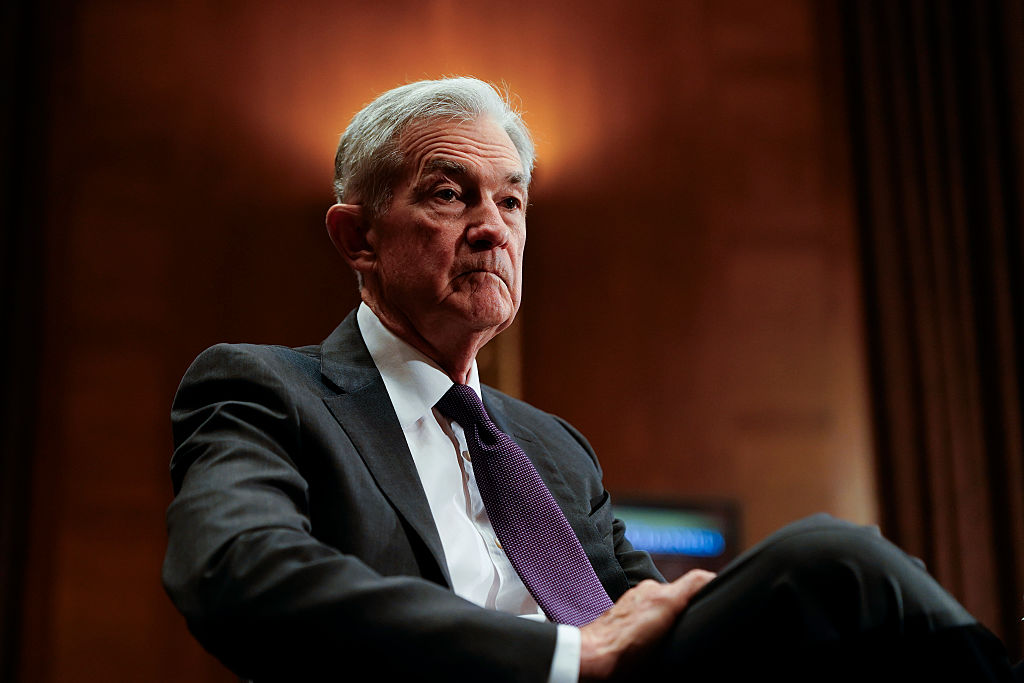Short-term inflation is almost certain. But what could make it a long-term problem?
Inflation will be welcomed when it arrives – but in time, it could grow to become a problem. John Stepek explains why, and what that will mean for investors.


Get the latest financial news, insights and expert analysis from our award-winning MoneyWeek team, to help you understand what really matters when it comes to your finances.
You are now subscribed
Your newsletter sign-up was successful
Want to add more newsletters?

Twice daily
MoneyWeek
Get the latest financial news, insights and expert analysis from our award-winning MoneyWeek team, to help you understand what really matters when it comes to your finances.

Four times a week
Look After My Bills
Sign up to our free money-saving newsletter, filled with the latest news and expert advice to help you find the best tips and deals for managing your bills. Start saving today!
Yesterday, US president Joe Biden managed to get another $1.9trn in spending signed off for the US economy.
The big concern for markets is that this is going to cause inflation to take off.
So investors were very relieved to learn – also yesterday – that so far, inflation has been pretty tame in the US.
MoneyWeek
Subscribe to MoneyWeek today and get your first six magazine issues absolutely FREE

Sign up to Money Morning
Don't miss the latest investment and personal finances news, market analysis, plus money-saving tips with our free twice-daily newsletter
Don't miss the latest investment and personal finances news, market analysis, plus money-saving tips with our free twice-daily newsletter
Will that state of affairs continue? Or are we right to be concerned?
Inflation isn't taking off just yet, but it's coming
Markets breathed a sigh of relief yesterday.
They've been getting worried about inflation. They think if it rises too fast, the Federal Reserve will also raise interest rates earlier than expected. As a result, bond yields have been rising. In turn, all the hottest stocks in the market have been falling.
But consumer prices in February in the US rose by 1.7% on last year. And the “core” measure, the one the Fed cares about, went up by 1.3%, which was a little below expectations.
So that cheered everyone up. Enough so that the latest sale of ten-year US Treasury bonds went very smoothly.
Of course, that's probably a bit premature. The economy isn't rip-roaring ahead just yet. There’s very likely to be an unexpected inflation surprise on the upside in the reasonably near future. And that's all before we even consider the latest near-$2trn getting pumped into the US economy.
You can read more about Joe Biden’s big stimulus package here. But the main takeaway from a UK point of view is simple: it means the US economy will grow by even more this year than it was already expected to.
Just to be clear – the nature of that growth is not important from our point of view over here. It's just an influx of money over and above the money that's already floating around the world. That all has to go somewhere, which means increased overall global demand.
(That said, to my mind, handing people $1,400 each – even if they don't need it – isn't the worst way for the government to spend money. No one knows better what they want and need than individuals. It's a very “free market” way to boost public spending. If you called it a tax cut instead of a handout, Republicans might even have voted for it.)
OK, so we know this is going to boost demand. We’ve already got a lot of pent-up demand. In lots of countries, lots of people have more savings than they did. And for all that being stuck in the house has been quite psychologically trying, I suspect that most people will be raring to go when the lockdowns are properly lifted and we're all vaccinated.
So we can expect a big surge in demand. That's pretty clear.
What about supply? Supply has been battered by lockdowns. That doesn't mean it won't come back. But it won't come back as quickly as demand. I realise that this sounds very simplistic – it is – but sometimes simplistic pictures drawn with fat crayons are far more honest than precision-tooled decimal-point-perfect forecasts that turn out to be complete nonsense.
So, here's the crayon drawing. You lock someone in their house and cut off half of their spending outlets, but you maintain their income. Once you let them out of the door, they'll spend that money. No, you won't get two haircuts (the classic smart-alec reply to this argument). But you might get one haircut, then celebrate with a nice meal you wouldn't have previously had.
Also, on the supply side, half the hairdressers in town have shut down permanently. As have half the restaurants. So the survivors are charging more. And for the moment, you’re happy to pay, because you’ve got more money, you probably want to support these businesses at some level, and you’re absolutely gagging for a good night out.
So, that all points to a surge in inflation at some point. The question then becomes – why would this become permanent or structural?
What could make inflation a long-term problem?
As Dylan Grice of Calderwood Capital once told us at a MoneyWeek roundtable: if there's one thing that the last decade or more has taught us, it's that no one really knows what sparks inflation.
So this is all conjecture. And so is whatever you read from anyone else.
But my main point would be that inflation is a process, not an event. When it starts off, it'll be welcomed in lots of ways, because inflation is what the authorities have been trying to encourage for decades.
This is precisely the reason that it will become entrenched and become a problem. Because it won't be tackled early in the process. And by the time it does become a problem, it'll be much harder to tackle, and it'll take a lot more effort. You just have to look at what Paul Volcker had to do in the 1980s to tackle inflation at that point.
I'm not saying we'll get a repeat of that. (Although it’s worth noting that my reluctance to contemplate double-digit inflation says something about how complacent we’ve all got, even a sceptic like me). But inflation of even 4% and above in developed markets would be quite the bucket of cold water for most investors.
Yes, we saw this in 2011 (inflation in the UK even spent some time above 5%, believe it or not), but that was driven by a surge in commodity prices against an extremely weak macroeconomic backdrop. I think it's hard to argue that today’s economy is anywhere near as weak as it was back then.
This all means that you need to consider your asset allocation very carefully indeed. This is something we've been writing a great deal about in MoneyWeek magazine. If you're not already a subscriber, you can get your first six issues, plus a beginner's guide to bitcoin, absolutely free when you sign up.
Get the latest financial news, insights and expert analysis from our award-winning MoneyWeek team, to help you understand what really matters when it comes to your finances.

-
 Could Chinese investments race ahead in the Year of the Horse?
Could Chinese investments race ahead in the Year of the Horse?As the Year of the Horse begins, we highlight the trends and sectors that could make great Chinese investments for the coming Lunar year
-
 Can mining stocks deliver golden gains?
Can mining stocks deliver golden gains?With gold and silver prices having outperformed the stock markets last year, mining stocks can be an effective, if volatile, means of gaining exposure
-
 How a dovish Federal Reserve could affect you
How a dovish Federal Reserve could affect youTrump’s pick for the US Federal Reserve is not so much of a yes-man as his rival, but interest rates will still come down quickly, says Cris Sholto Heaton
-
 New Federal Reserve chair Kevin Warsh has his work cut out
New Federal Reserve chair Kevin Warsh has his work cut outOpinion Kevin Warsh must make it clear that he, not Trump, is in charge at the Fed. If he doesn't, the US dollar and Treasury bills sell-off will start all over again
-
 'Investors should brace for Trump’s great inflation'
'Investors should brace for Trump’s great inflation'Opinion Donald Trump's actions against Federal Reserve chair Jerome Powell will likely stoke rising prices. Investors should prepare for the worst, says Matthew Lynn
-
 'Governments are launching an assault on the independence of central banks'
'Governments are launching an assault on the independence of central banks'Opinion Say goodbye to the era of central bank orthodoxy and hello to the new era of central bank dependency, says Jeremy McKeown
-
 Will Donald Trump sack Jerome Powell, the Federal Reserve chief?
Will Donald Trump sack Jerome Powell, the Federal Reserve chief?It seems clear that Trump would like to sack Jerome Powell if he could only find a constitutional cause. Why, and what would it mean for financial markets?
-
 Can Donald Trump fire Jay Powell – and what do his threats mean for investors?
Can Donald Trump fire Jay Powell – and what do his threats mean for investors?Donald Trump has been vocal in his criticism of Jerome "Jay" Powell, chairman of the Federal Reserve. What do his threats to fire him mean for markets and investors?
-
 Do we need central banks, or is it time to privatise money?
Do we need central banks, or is it time to privatise money?Analysis Free banking is one alternative to central banks, but would switching to a radical new system be worth the risk?
-
 Will turmoil in the Middle East trigger inflation?
Will turmoil in the Middle East trigger inflation?The risk of an escalating Middle East crisis continues to rise. Markets appear to be dismissing the prospect. Here's how investors can protect themselves.